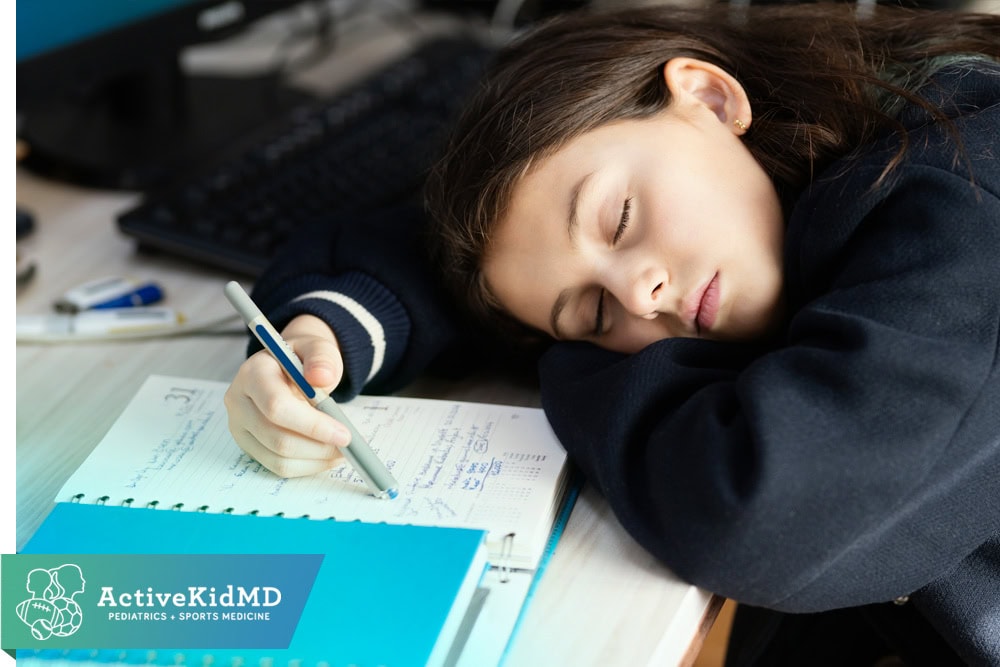One of the most effective ways to set a child up for success at the start of the school year is by helping them return to a consistent bedtime and sleep routine. Sufficient, high-quality sleep—10–11 hours per night for elementary-aged children and at least 8 hours for high school students—is essential for academic performance, emotional regulation, and overall well-being.
Sleep deprivation in children can lead to lower academic and extracurricular performance, as well as an increased risk for emotional and behavioral challenges. Yet despite parents’ best efforts, many children continue to struggle with getting the rest they need.
As a pediatric and sports medicine specialist, here are some of the most common concerns heard from families about children not getting enough sleep and what can be done to help.
 “My child can’t fall asleep.”
“My child can’t fall asleep.”
At the start of the school year, it’s common for children, especially adolescents, to have difficulty transitioning from late summer bedtimes to earlier school-night schedules. It is best to make gradual adjustments by moving bedtime 20–30 minutes earlier each night until the desired bedtime is set.
Many children also struggle to wind down at night. A structured pre-bedtime routine can be highly effective. Recommendations include avoiding electronic devices at least one hour before bed, creating a dark and calm sleep environment, and removing clocks from the bedroom to reduce anxiety around falling asleep.
Electronic use is a frequent sleep disruptor. Children should go “off the grid” from 10 p.m. to 6 a.m. to improve both falling asleep and staying asleep. Families often report noticeable improvements in sleep quality after implementing this simple change. This is also very sensible advice for adults as well.
For children who consistently experience active minds at bedtime, school-related anxiety is often a contributing factor. These worries might involve academic performance, peer relationships, or feelings of inadequacy in the classroom. Open and honest conversations can help uncover underlying issues and open the door to appropriate support or treatment.
 “My child has too much homework, or practice starts too early or goes too late.”
“My child has too much homework, or practice starts too early or goes too late.”
When students lose sleep due to demanding academic or extracurricular schedules, it can trigger a counterproductive cycle. Slower thinking and decreased focus caused by fatigue can increase the time needed to complete homework, leading to even less sleep the following night.
Parents should consider the following:
- Is the amount of homework developmentally appropriate for the child’s age and grade?
- Are attempts at multitasking (such as checking social media while doing assignments) part of the problem?
- Are there any signs of learning difficulties present, such as poor focus, repeated re-reading, or trouble completing tasks? Conditions like ADHD, dyslexia, or OCD can interfere with sleep and productivity.
Tip: Don’t just focus on grades. While daily hard work is commendable and desired, overworking and missing sleep/other activities aren’t such great things.
- Is the class or sports schedule realistic?
While academic achievement is important, parents should be cautious not to equate overworking with success. When lack of sleep interferes with mood, learning, or physical health, it may be time to reevaluate the child’s schedule.
Reassessing the rigor of both class selections and extracurricular commitments may also be necessary. Although difficult, these conversations can lead to meaningful improvements in sleep, mood, and performance.
“My child keeps waking up at night.”

- Coughing: Persistent coughing may be a sign of under-treated asthma or sinus problems. Managing these conditions can lead to more restful sleep for both the child and the family.
- Snoring: Chronic snoring may indicate enlarged tonsils or adenoids, or ongoing sinus irritation. In some cases, surgical removal can lead to significant improvements in sleep quality and daytime behavior.
Also see: Should I Weep If My Child Snores During Sleep? - Skin irritation: Children with eczema or other skin conditions may wake frequently due to itching. Addressing skin health can help reduce sleep interruptions.
Supporting Healthy Sleep for a Stronger School Year
Sleep is a foundational part of a child’s health that is equally important as nutrition, physical activity, and academic engagement. Parents should not hesitate to ask tough questions or seek professional help when sleep concerns arise. When sleep improves, so does mood, focus, and resilience, helping children feel more energized and ready to thrive.
Also see: https://www.youtube.com/watch?v=XcUt7ZnFfAU&list=PLL11EAaJTVuUwJgmUdYt_r-KsHg_5eRUu&index=3


 “My child can’t fall asleep.”
“My child can’t fall asleep.” “My child has too much homework, or practice starts too early or goes too late.”
“My child has too much homework, or practice starts too early or goes too late.”